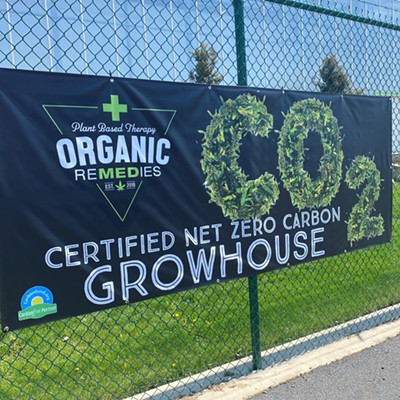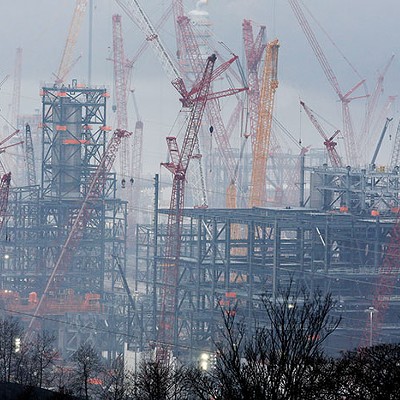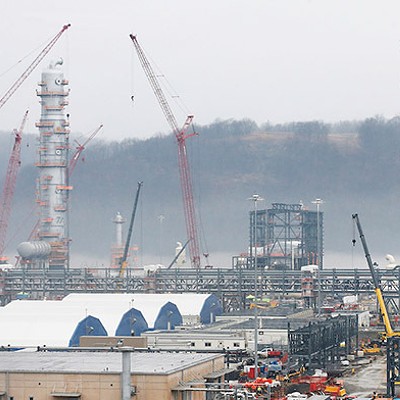Thursday, July 31, 2014
EPA Carbon-Emissions Hearings
Here’s a dispatch from the first two hours of this week’s public hearings on a proposed rule to limit carbon emissions from coal-fired power plants.
Pittsburgh is one of four cities hosting hearings, and so many people signed up to speak that the EPA added a second day of all-day hearings — and then added a second room for each of those sessions in Downtown’s William S. Moorhead Federal Building. The rule is the first national attempt to limit emissions of carbon, the main greenhouse gas behind climate change.
For much of the morning, the 13th-floor hearing room was crowded by a few dozen guys in the green-camo T-shirts of the United Mine Workers union, which opposes the EPA’s Clean Power Plan. But of the first 24 speakers to address the hearing panel, 17 supported the plan. Several, including representatives of the National Wildlife Federation and the American Lung Association, even called for stronger regulations.
Because coal is the source of 75 percent of all carbon emissions from U.S. power plants, the Clean Power Plan would in effect restrict how much coal we can burn. Supporters argued that in addition to helping slow climate change, the new rules would reduce other air pollutants of the sort that lead to asthma, for instance — as well as lessening the dangers posed by rising temperatures and fiercer storms. Several spoke of a “moral obligation” to address climate change.
“It is an ethical decision as to whether we leave our children a living earth or an earth that has been devastated by fossil-fuel combustion,” said Patricia DeMarco, a visiting researcher at Carnegie Mellon University.
And Erie County Executive Kathy Dahlkemper told the panel, “Reducing carbon emissions is a matter of public health.”
The Clean Power Plan requires each state to craft its own plan to cut carbon emissions, with the goal of reducing emissions by 30 percent from 2005 levels by 2020. A few state-level officials from Pennsylvania and West Virginia also addressed the panel.
Vince Brisini, who heads the Pennsylvania Department of Environmental Protection, said, “Pennsylvania does support efforts to reduce carbon-dioxide emissions.” The statement was not unsurprising, given that the Corbett administration has at times questioned whether climate change is real. But Brisini spoke against the Clean Power Plan, saying it was too restrictive and that the EPA’s promise that the Clean Power Plan gives states flexibility of implementation is “illusory.”
West Virginia Secretary of State Natalie Tennant said that under the proposed rules, coal miners would lose their jobs and their pensions. She also complained about the siting of the hearings, too far from her state’s coal fields. “The White House and the EPA have chosen to snub West Virginia,” she said.
The morning’s most novel arguments also came from two opponents of the Clean Power Plan. According to Dennis Simmers, of Cambria Township, and West Virginia State Rep. Cindy Frich, we can’t do anything to harm the coal industry because we need a thriving coal industry to protect us … from the ill effects of coal.
Simmers spoke about the burning of waste coal, the stuff that for most of the 20th century mining companies left in huge piles in places like Western Pennsylvania because it was too low-energy to burn. Now some power plants do burn it, reducing those piles, with their smell, their dust and their toxic runoff. Simmers fears the Clean Power Plan would end that practice.
Simmers and his two daughters attended the hearing in black T-shirts reading, “Waste coal is not a waste. It’s energy online, all the time.” He praised the efforts of coal-fired plants in eliminating the big piles near his home in Revloc, Pa. “Waste-coal fire power is the very definition of environmental stewardship,” he said.
Opponents of burning waste coal say that combusting it is even dirtier than burning conventional coal, and doesn’t reduce the waste tonnage by much.
Then there was Frich, a Republican who represents the Morgantown area. “These rules are an existential threat to my state,” she said. She argued, in part, that coal companies had to be protected because they’re the ones currently paying to remediate the waterways coal companies spent the past century or so polluting.
Frich also shared her doubts about climate change. “I’m confused how these rules protect public health and safety,” she said. “I find it hard to understand how carbon is a pollutant,” she added.
Frich went so far as to say the Clean Power Plan would cripple the nation. “Why would a country do this to themselves? Why?” she said. “I believe this is economic suicide,” she added. “It is going to impact on national security in a very grave manner.”
Coincidentally, Frich spoke this morning just after Jonathan Breed, a Navy veteran and adjunct fellow at think tank the American Security Project who spoke in support of the Clean Power Plan. Breed said the real national-security concern would be to ignore climate change. “The United States can no longer wait to confront the threats posed by climate change,” he told the panel. Breed said that the pressures of drought and extreme weather globally can lead to political instability and even incite terrorism. He added that the U.S. military began looking at climate change as a security threat a decade ago.
Other opponents of the new rules raised fears of skyrocketing energy prices and even power shortages. For such reasons, “We can’t afford” to take coal plants off line, said Michel G. Moffatt, who’s running for a seat in the West Virginia legislature. “Coal is West Virginia,” he added.
Meanwhile, several supporters of the Clean Power Plan noted at the hearing that even without it, we’re halfway to achieving its goal of reducing carbon emissions from power plants by 30 percent from 2005 levels by 2030. (The reasons include decreased consumption and a move to cheaper natural gas, which emits less carbon when burned than does coal.) Speakers including Shannon Fisk, of the nonprofit Earthjustice, said a 40 percent reduction in emissions by 2020 is achievable, and more in line with what’s needed to prevent the worst effects of climate change.
The EPA hearings continue until 8 p.m. tonight, and from 9 a.m.-8 p.m. tomorrow.
The EPA is also accepting comments about the Clean Power Plan in writing, by mail or via the web, until Oct. 16. For more information, see www2.epa.gov/carbon-pollution-standards.
Tags: EPA , Clean Power Plan , carbon emissions , climate change , coal-fired power plants














